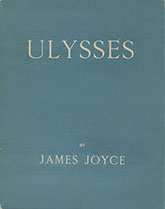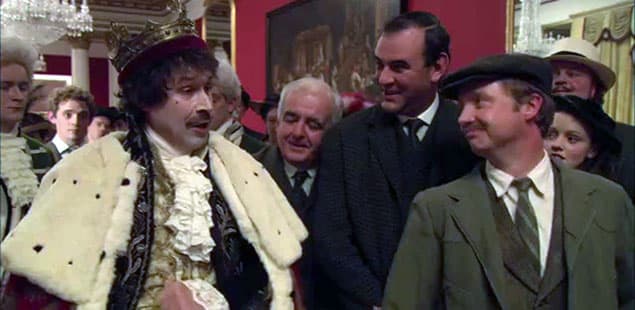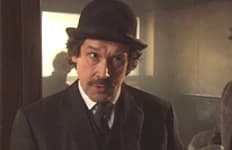Ulysses
Critique • Quotes • At the movies
 First edition
First editionFirst publication
1822
Literary form
Novel
Genres
Literary
Writing language
English
Author's country
Ireland
Length
Approx. 286,000 words

Leopold Bloom (Stephen Rea) enjoys a regal fantasy in Bloom, the 2003 adaptation of Ulysses.
The sexy version
Bloom (2003): Also known as Bl,.m; film, 113 minutes; director Sean Walsh; writer Walsh; featuring Stephen Rea, Angeline Ball, Hugh O'Conor
The latest film of Ulysses fares somewhat better that the everything-in 1967 version. The Irish production of Bl.,m (no typos, that's the title, although it's usually referred to as Bloom) raised a controversy in the U.K. when released in 2003 for not being as faithful to the book. It drops major scenes such as Bloom at the newspaper office and adds minor sequences not found in the novel. At ninety-nine minutes it is obviously too short to deliver even a fraction of the full depth and breadth of James Joyce's thick, complex novel.
But the literary-minded critics are missing a key point. This adaptation recreates the Joycean vision as a movie. This colourful remake comes closer than the more literal version in delivering the sensual experience of the original literature.
Molly Bloom's bawdy soliloquy from her bedroom is used to frame the work rather than merely conclude it, and we get her unspoken comments on her husband and lovers intermittently throughout the piece. This integrates Molly's story with that of Leopold and Stephen, rather than keep it strangely separate as it appears in the novel and the earlier film. It also adds depth and poignancy to Bloom's own stream-of-conscious rambles as he roams the house city.
Angeline Ball's sexy Molly is a straightforward lustful and lusty creature, but almost innocently so, not a slattern at all, and we see her genuine affection for Poldy, as she calls him, peeping through.
Veteran Irish actor Stephen Rea appears at first to be a mousy Bloom, going about with a hangdog expression. Not at all the buffoon of the earlier portrayal. A quiet, serious man going about his business in an often hostile, ridiculing social environment.
But we come to see him as heroic as he lashes back at anti-Semitism. Moreover, we come to see his acquiescence in his spouse's obvious infidelity and his putting up with her ignorance not as the demeanor of a wife-whipped man but as a kind of respectful love.
Not that he is entirely noble. A scene of masturbating on the beach at the sight of a young woman's knickers and the hallucinogenic Nightgown sequences get him down to the basics on a par with his randy wife.
What suffers in this version is the relation between Bloom and Dedalus. Much is made of Bloom's regret over having lost a son at birth, setting up the union of the two men as a father-son substitution. And their meeting after an evening in the brothel is momentarily touching but the late-night time they spend together finding an intellectual rapport is only briefly depicted, leaving few emotional reverberations.
Hugh O'Conor (the young Christy Brown in My Left Foot) is a laudable Stephen Dedalus, shining especially in witty scenes with his students, employers and fellow layabouts (including Alvaro Lucchesi, who is stately and plump, as jovial cynic Buck Mulligan).
Overall, the critics are right in pointing out only parts of Joyce's story are told, but they are told as a rich—I could even say, loving—cinematic experience. Not everyone's cup of tea. The novel is still basically unfilmable. But this attempt comes close to getting across some of the essential passion beneath all those words.
— Eric
Critique • Quotes • At the movies
1967, 2003


